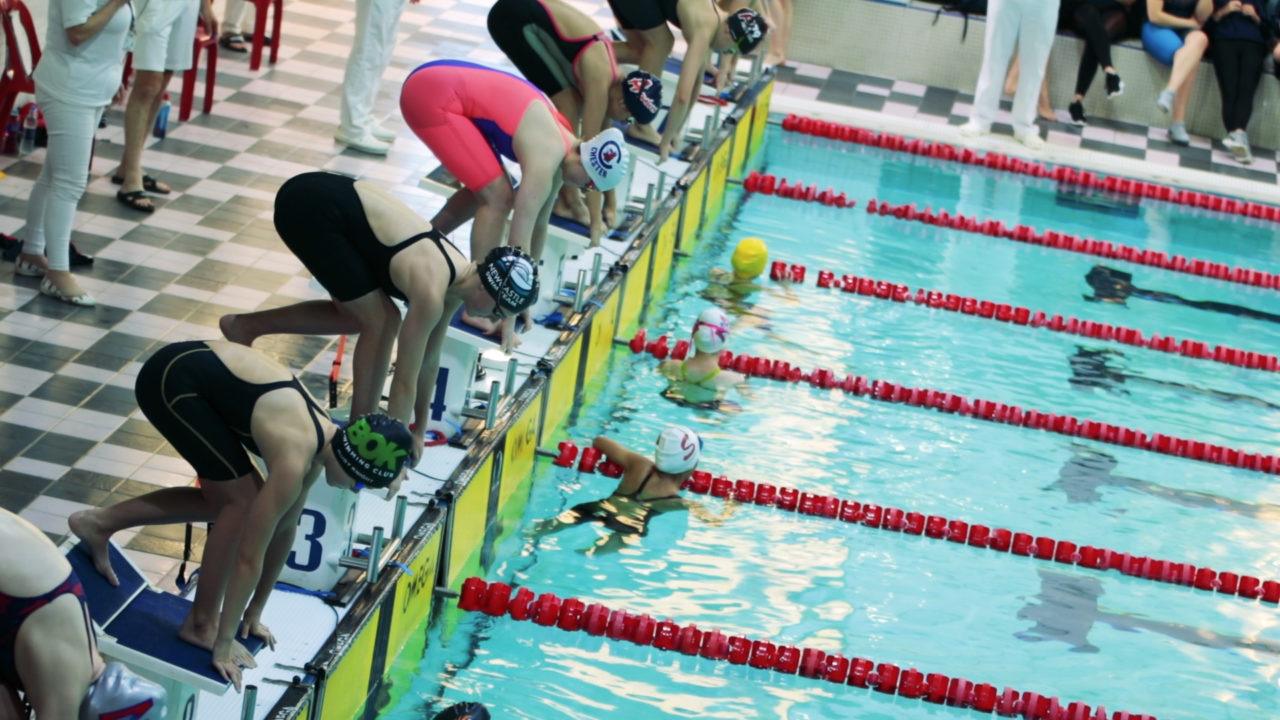SwimSwam welcomes reader submissions about all topics aquatic, and if it’s well-written and well-thought, we might just post it under our “Shouts from the Stands” series. We don’t necessarily endorse the content of the Shouts from the Stands posts, and the opinions remain those of their authors. If you have thoughts to share, please send them to [email protected].
This “Shouts from the Stands” submission comes from Megan Mardy, a Masters swimmer from Illinois who previously swam at the NCAA Division II Championships for Amherst College.
My favorite college psychology professor, Catherine Sanderson, often posts reels with quick social psychology tips regarding happiness. Recently, she was revisiting the famous Theodore Roosevelt quote, “Comparison is the thief of joy.” She discusses this quote often, as it is quite important in the context of many social psychology concepts. I couldn’t help but link this to some valuable advice I received from a seasoned swim parent when my kids had just started in the sport.
Of course, the best advice is to let the coaches coach and the parents parent. However, realistically, parents sit in the stands for hours upon hours, talking to other parents, watching other kids swim, and comparison is just a natural human tendency. So how do we engage in comparison responsibly and in a way that is respectful to our swimmers?
I was sitting at a prelims/finals meet with a friend who also happens to be a former Olympian. His son was in high school at the time and my friend was telling me about his progress. He advised me that the best way to measure a swimmer’s progress is to compare a swimmer’s results from a particular meet to the swimmer’s results from the same meet (or a meet around the same time) in the prior year.
Comparing your swimmer’s results to his or her results at end-of-season or championship meets doesn’t take into account the season’s training cycle. The type of training and the yardage changes as the season progresses, and it isn’t productive to compare results at early- or mid-season meets to results achieved at the end of a season, as those end-of-season meets reflect a full season of training and a training taper down to produce maximum speed. Instead, it is best to look at how they have progressed as compared to the same meet last year. Younger swimmers are likely to see bigger drops in time when compared to prior year performances, and older swimmers usually see smaller drops as they are working on refining minor details that take time to implement and master in races.
The big comparison that we must avoid as swim parents is comparing our swimmer’s results to that of other kids. It is hard to resist the urge to compare, especially given that the kids engage in constant comparisons themselves and Meet Mobile makes it all too easy to track results. However, comparing kids to their teammates or competitors ultimately doesn’t do any service to kids who deserve to be treated like the unique individuals who they are. Physically, they are all different ages, sizes and in different stages of growth and development. This particular passage from the USA swimming coaches training handbook has always resonated with me:
“During childhood kids grow on average 2.5 inches in a year and gain five pounds per year. Athletes of the same chronological age can vary by as much as five years in biological maturation! So, with two 13-year-old swimmers, biologically one may be 10 years and the other 16 years – – what a huge difference.”
Furthermore, the kids all have different things going on in their lives at school, socially, and at home. Sleep, eating habits and emotional state also all play into athletic performance. Kids have a lot going on these days and we need to give them the grace they deserve given their very busy lives.
I cannot say that my household applies this comparison advice perfectly all (or even most of) the time, and younger kids definitely have more of a laser focus on what their peers are doing and achieving, but we try and use this advice as a compass to guide our kids back to focusing on process over outcome earlier on in the season. I hope that other parents who are new to the sport find it useful as well.
 ABOUT MEGAN MARDY
ABOUT MEGAN MARDY
Megan started as an age group swimmer and went on to swim for Amherst College, where she was a NCAA Division III qualifier. After a fifteen year break and three kids, Megan returned to the pool as an Illinois masters swimmer, where she achieved several top ten rankings in the backstroke events. Megan is on a permanent break from her career as an attorney and has volunteered as an assistant age group swim coach and USA swimming official. Her three kids are currently age group and high school swimmers.


I agree with the premise, but as a “first generation” swim parent and GenXer that has no clue how swimmers advance, how do I gain perspective without data? I don’t compare to berate or breed jealously. I use it to gauge progression and better understand growth. A tool like myswimio allows me to look at Olympic swimmers and other fast club kids to see how they did it. I.e. there is a kid going to OTs and he didn’t start until 12 years old! That’s good data to tell an older kid just starting. So, negative comparisons are bad. Gleaming perspective I think is good.
My name is Anne Mueni from Kenya. I love swimming and am currently constructing a swimming pool for children. I need funding to complete this project and am looking for well wishers to partner with me.
I’ve thought of this quote a lot. Good advice for an age-grouper. As a competitive masters swimmer and times get slower, comparison, it seems, is all that is left.
GREAT ARTICLE. Just shared this with our Swim Club’s Parents Association.
Since we are ‘giving advice’ please SwimSwam writers, stop talking about ‘Oceanic records’. There is no such thing. They are ‘Oceanian records’
To: Australia
From: The United States
100% agree. Comparing will make you crazy!